How global collaboration can support elders experiencing the effects of trauma but eager to exercise their resilience.
LeadingAge members often talk about their mission to help older Americans live healthy and meaningful lives. Those powerful adjectives—healthy and meaningful—took on new meaning for me during a recent trip to South Korea and Cambodia.
I traveled in late May to participate in several events sponsored by the Global Ageing Network Korea, an affiliate of the Global Ageing Network.
My first stop was at Yonsei University in Seoul for a symposium that provided a great opportunity for researchers and clinicians from the U.S. and South Korea to share strategies for facilitating healthy and meaningful aging among older adults living in community.
A few days after the symposium, I took a 1-hour flight to Jeju Island to visit with older adults living in a pristine, self-governing province located in the Korea Strait.
TRAUMA ON JEJU
Jeju island’s beauty belies its troubling past. The suppression of an attempted uprising on the island from April 1948 to May 1949 resulted in the deaths of up to 60,000 people, or 25% of the island’s population, by some reports. The island has made remarkable strides in moving beyond those events and claiming a new identity as a popular holiday destination for travelers from across Asia, and as a World Heritage Site designated by the United Nations Educational, Scientific, and Cultural Organization (UNESCO).
Despite this progress, however, the trauma of the uprising and its aftermath still affects many older citizens who are now aging in community.
It was an honor to meet with some of the survivors of this painful chapter in South Korean history, and to confer with local organizations about the best ways to support these elders, and help them live healthy and meaningful lives.
I hope I offered some good strategies for meeting this need on Jeju Island. But, to be honest, I received more insights than I offered. I was impressed, both by the resilience of elders who had lived through this trauma in their youth, and by the creativity of the agencies that are now working so hard to develop ways, including the possible construction of an intentional community, to support these elders.
Organizations in Jeju are already making great strides in engaging older citizens with one another and with their community through a remarkable senior center that I visited during my stay. I was particularly taken with the delicious Korean meal prepared by some of the senior center participants, and the mobile acupuncture unit that arrives regularly to provide on-site health care services to elders.
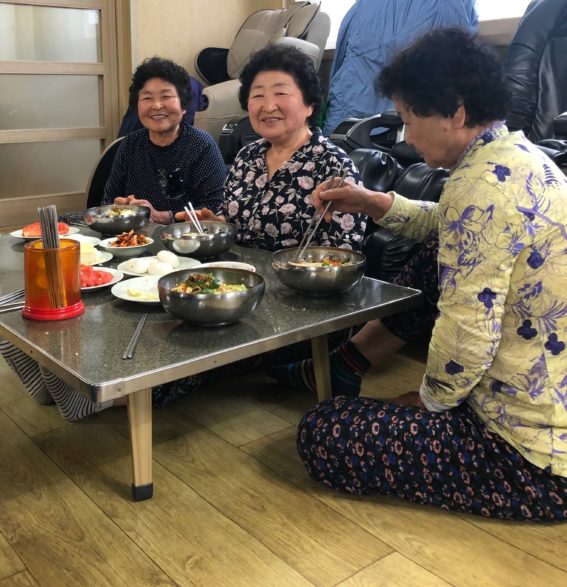
Older Koreans enjoy lunch at their senior center on Jeju Island.
A GLOBAL SOLUTION
The visit to Jeju opened my eyes to the unique challenges that many older people around the world face as they try to build healthy and meaningful lives. It also helped me appreciate the striking similarities among elders worldwide, and how those similarities create opportunities for professionals the field of aging services to help one another support populations with unique needs.
These similarities became even more clear to me when I left Jeju to visit friends in Cambodia. During my stay, my host expressed concerns about the well-being of his parents, who lived through the brutal genocide conducted by the Khmer Rouge from 1975 to 1979. That genocide claimed the lives of up to 2 million people, approximately 25% of Cambodia’s population.
My friend, whose parents live in rural Cambodia, is really worried about the elders who survived the Khmer Rouge but remain traumatized by the genocide. Fresh from my conversations with elders in Jeju, I understood those concerns. But I also shared with my friend the encouraging news that there are strategies being developed, implemented, and tested around the world that could help the elders about whom he is concerned.
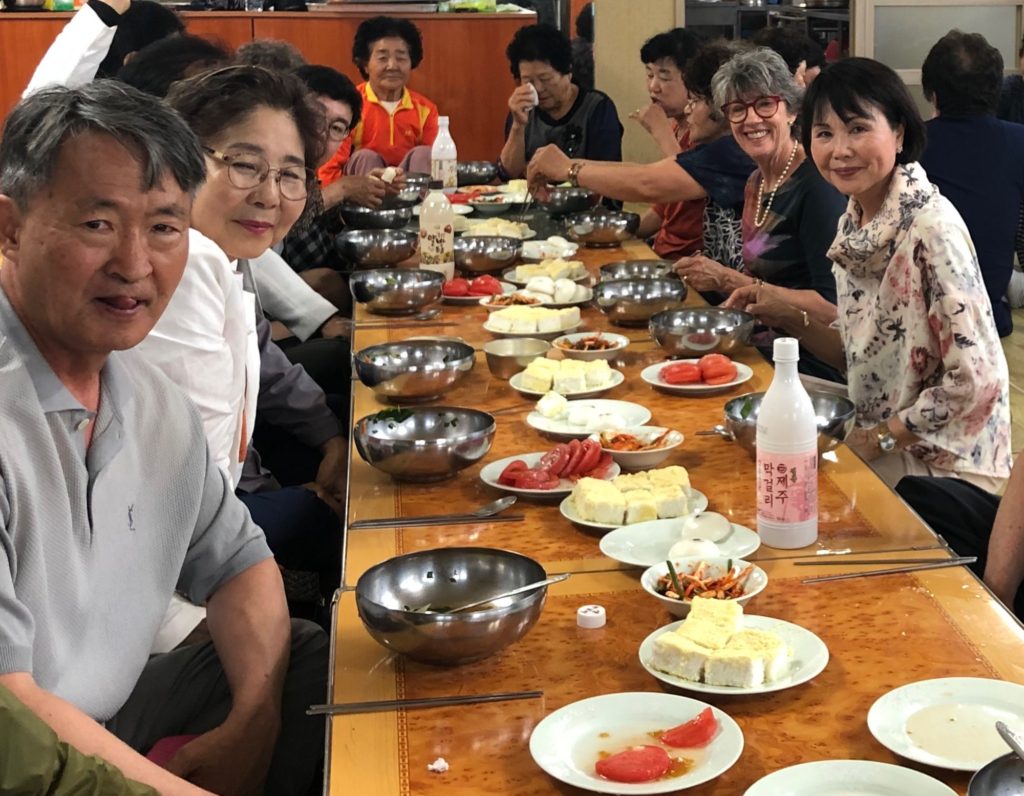
Participants in the Global Ageing Network Korea Symposium enjoy lunch prepared by older adults at a senior in on Jeju Island.
THE IBASHO MODEL
One such strategy is being implemented by Ibasho, a nonprofit organization that promotes the value of integrating elders into their communities.
The Ibasho model gives community members of all ages and abilities a gathering place — called an “Ibasho Café” — where they can develop deeper connections with each other, work together to make useful and relevant contributions to their community, and bolster resilience among traditionally excluded groups, including elders, women, and persons with disabilities.
The Ibasho approach was implemented successfully in Ofunato, Japan, after the Great East Japan Earthquake in 2011; in Barangay Bagong Buhay, the Philippines, after Typhoon Haiyan in 2013; and in the village of Matatirtha in central Nepal, which experienced massive destruction during a 7.8 magnitude earthquake in April 2015.
I don’t see why the model couldn’t be tailored to build resilience and foster health and meaning among elders in Jeju and Cambodia.
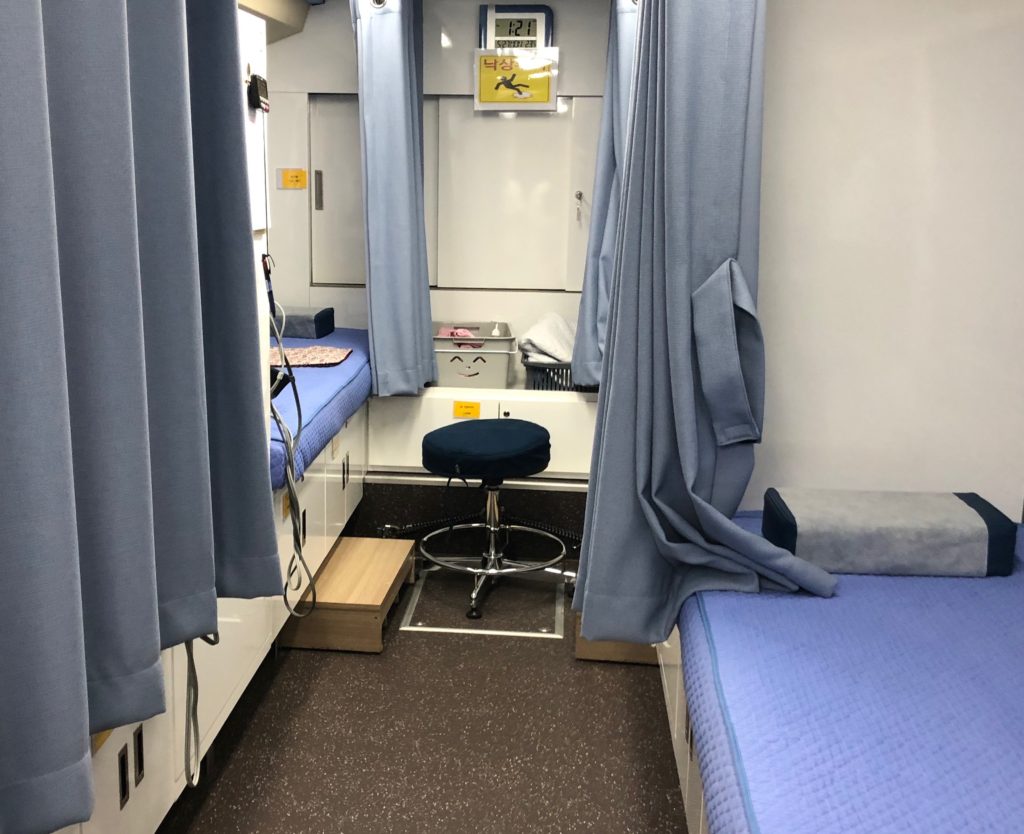
A mobile acupuncture unit visits the Jeju Island senior center regularly to provide health services to participants.
THE POWER OF COLLABORATION
What great potential we have to collaborate with others around the world to find solutions to pressing issues facing older adults. And how exciting it is to take a global perspective when viewing and addressing those issues.
I really do think that global collaboration and action will help us take proven models like Ibasho and tailor them to the cultures of South Korea, Cambodia, and other places around the world so we can support elders who are experiencing the effects of trauma but who are eager to exercise their resilience.
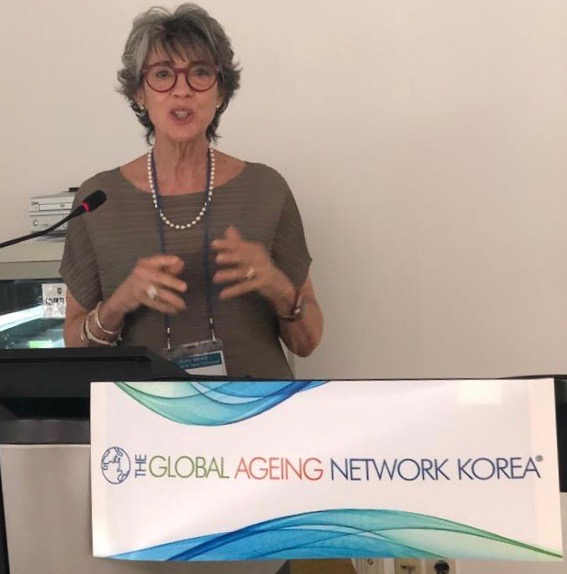
Robyn Stone, co-director of the LTSS Center, discusses healthy aging in community at the Global Ageing Network Korea Symposium, held at Seoul’s Yonsei University in May.
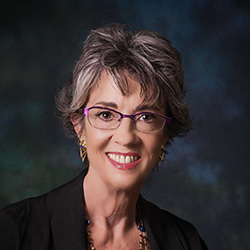
Robyn I. Stone, DrPH, is senior vice president of research at LeadingAge, and co-director of the LeadingAge LTSS Center @UMass Boston. Her widely published work addresses long-term care policy and quality, chronic care for people with disabilities, the aging services workforce, affordable senior housing, and family caregiving.
